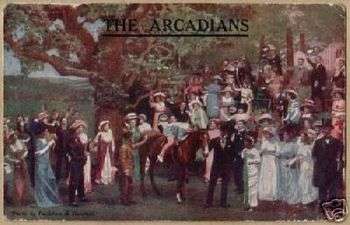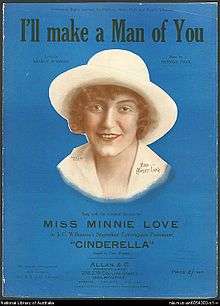Arthur Wimperis

Arthur Harold Wimperis (3 December 1874 – 14 October 1953) was an English illustrator, playwright, lyricist and Academy Award-winning screenwriter.
Early in his career, Wimperis was an illustrator. For 25 years beginning in 1906, he became a librettist and lyricist for musical comedies, including the hit The Arcadians in 1909 and many other musicals. Beginning in 1930, he moved into writing screenplays for British films, and later Hollywood films, contributing to dozens of screenplays.
Biography
Wimperis was born in London, the son of Edmund Morison Wimperis and Anne Harry Edmonds.[1] Educated at Dulwich College and University College London, he began a career as an illustrator on the Daily Graphic.[2][3] This was soon interrupted by service in the Second Boer War from 1899 to 1902 with Paget's Horse.[2][4]
1906–1930: Theatre and songwriting years

Wimperis then began a theatre writing career as a lyricist and librettist for Edwardian musical comedies in London. His first major show was The Dairymaids (1906), which was favourably reviewed by The Times, though the derivative nature of the plot was noted, as was the similarity between the lyrics for the song "Mary in the Dairy" and an earlier Punch magazine parody of a musical comedy number which contained the words, "Mary, Mary, managed a dairy". This similarity was attributed to the paucity of rhymes for Mary, rather than deliberate plagiarism.[5] The show was followed by The Gay Gordons written with Seymour Hicks in 1907. He next contributed songs (including "The Pipes of Pan", "I've Got a Motter", "Arcady Is Always Young", and "Half Past Two") for one of the most popular musicals of the Edwardian age, The Arcadians (1909), as well as to the short-lived The Mountaineers. In addition to contributing lyrics or dialogue to other shows, he then began adapting Viennese operettas into English. The best-known of these are The Balkan Princess (1910) and The Girl in the Taxi (Die keusche Susanne; 1912). He also wrote for The Sunshine Girl (1912). Wimperis also wrote lyrics for reviews such as The Follies and The Passing Show of 1914, and many of his songs became music hall hits, such as "Gilbert the Filbert" and "I'll Make a Man of You".[6]
He served in the Royal Artillery as a temporary second lieutenant during the First World War,[7] and then resumed playwriting and songwriting, including for My Lady Frayle (1916) and Pamela (1917). In 1925, he wrote the English-language adaptation of for the American production of Sigmund Romberg's Louie the Fourteenth, and the next year he had another hit with Princess Charming in London. His last London success was a vehicle for Binnie Hale in 1930 called Nippy. Wimperis also contributed lyrics and scenes to many other reviews and musicals in London and New York and created English-language adaptations of several French and German plays.[6]
1930–1953: Film years
Wimperis then wrote screenplays and additional dialogue for British films. His first major film was Harmony Heaven in 1930. His film career quickly began to flourish under the guidance of director and producer Alexander Korda.[8] He collaborated on many screenplays with Lajos Bíró.[4] Some of his best-known films of the 1930s were The Men of Tomorrow (1932), Wedding Rehearsal (1932), Cash (1933), The Private Life of Henry VIII (1933), The Private Life of Don Juan (1934), Catherine the Great (1934), The Scarlet Pimpernel (1934), Princess Charming (1934), Brewster's Millions (1935), Knight Without Armour (1937), The Divorce of Lady X (1938),[9] The Drum (1938) and The Four Feathers (1939).[4]
Wimperis also wrote the lyrics for the songs heard in the Paul Robeson film Sanders of the River (1936). In the 1940s, and until his death, Wimperis worked in Hollywood for MGM.[4] Crossing the Atlantic in 1940 at the height of the Second World War during the Battle of the Atlantic, his ship was torpedoed, and he was one of just eight survivors of the 32 people who had been in the same lifeboat.[2] He won an Academy Award for Best Writing for his contribution to the screenplay of Mrs. Miniver (1942), in which he also had a small acting part. He was also nominated for another Oscar for his contribution to the screenplay of Random Harvest (1942).[10] His later films included If Winter Comes (1947), Julia Misbehaves (1948), The Red Danube (1949), That Forsyte Woman (1949), Calling Bulldog Drummond (1951), Young Bess (1953) and Storm Over the Nile (1955).[8][9] In 1990, some of his songs were used in The Fourth War.
Wimperis died in Maidenhead, Berkshire, England at the age of 78.
Selected filmography
|
|
Notes
- ↑ "Edmund Walter Wimperis", Dictionary of Scottish Architects, accessed September 24, 2016; and Dodgson, Campbell. "Wimperis, Edmund Morison" in Sidney Lee, Dictionary of National Biography, 1901 supplement, London: Smith, Elder & Co.
- 1 2 3 "Mr. Arthur Wimperis – Craftsmanin the Theatre", The Times Obituaries, 15 October 1953, issue 52753, p. 10, col. E
- ↑ Biography for Arthur Wimperis at the IMDB database
- 1 2 3 4 Erickson, Hal. Arthur Wimperis Archived 26 April 2006 at the Wayback Machine., AllMovieGuide, accessed 23 September 2016
- ↑ "Apollo. The Dairymaids, The Times, Reviews, 16 April 1906, issue 37995, p. 10, col. A
- 1 2 Arthur Wimperis biography at the British Musical Theatre site of The Gilbert and Sullivan Archive (2004)
- ↑ The London Gazette: (Supplement) no. 32571. p. 264. 9 January 1922. Retrieved 6 October 2008.
- 1 2 Langman, pp. 152–53
- 1 2 "Arthur Wimperis (1874–1953)", Biography at Katz's Film Encyclopedia
- ↑ Awards page for Arthur Wimperis at the IMDB database
References
- Gänzl, Kurt. The Encyclopedia of the Musical Theatre
- Langman, Larry. Destination Hollywood: The Influence of Europeans on American Filmmaking, McFarland, 2000 ISBN 0-7864-0681-X
External links
- Arthur Wimperis at the IMDB database
- Arthur Wimperis at the IBDB database
- Arthur Wimperis Annotated filmography at Fandango.com